Pressure Washing Gypsum
Find the best Driveway Cleaning in Gypsum
Get multiple Exterior Cleaning quotes for your project today! Compare profiles, reviews, accreditations, portfolio, etc... and choose the best deal.
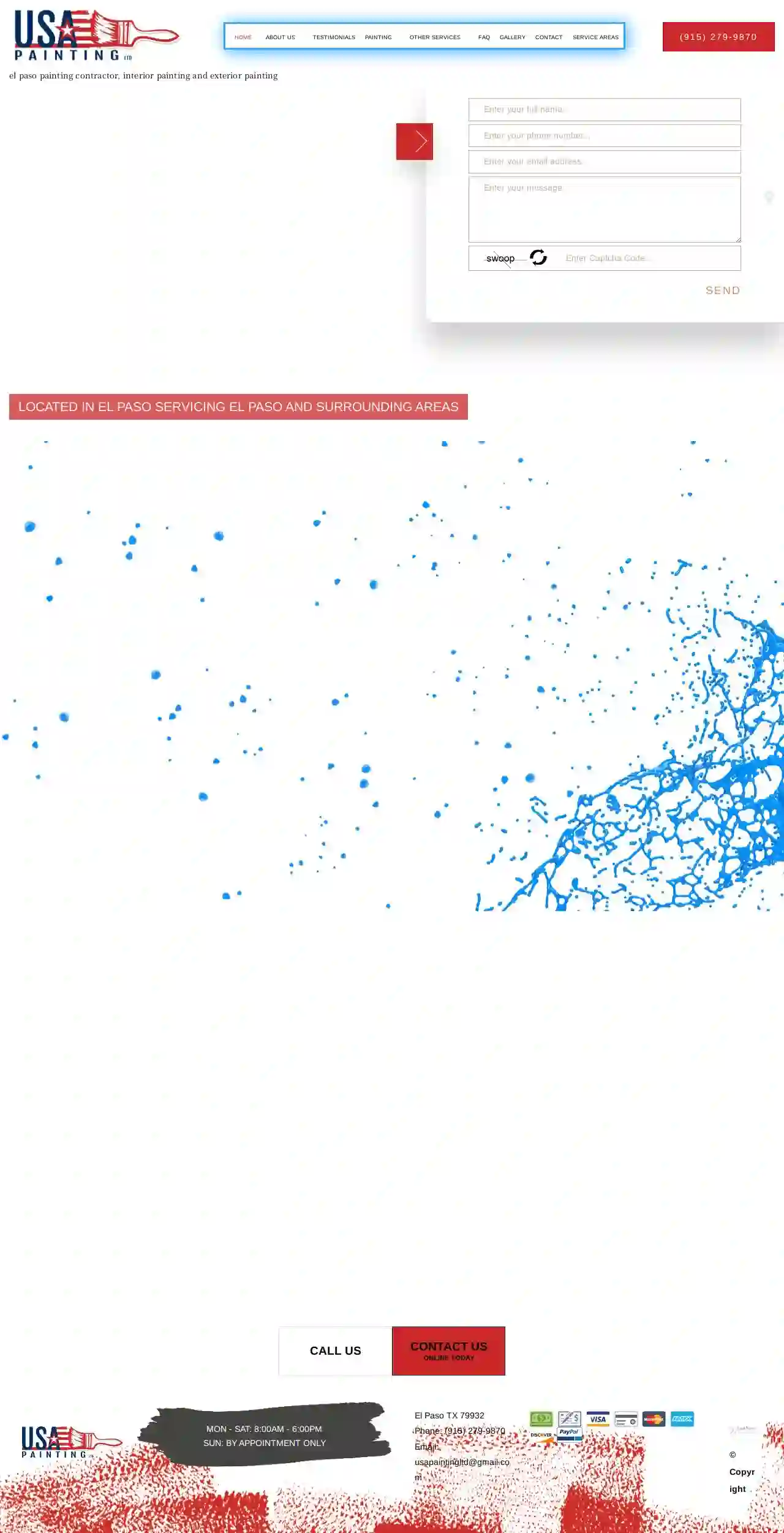
USA Painting Ltd.
El Paso, 79932, USUSA Painting Ltd. is a team of dedicated local painters serving El Paso and surrounding areas. We are committed to providing the best painting services, treating every building as if it were our own. We believe in building lasting relationships with our customers, treating them like neighbors and ensuring their satisfaction. Our team is fully trained and experienced, using high-quality tools and materials to deliver exceptional results. We offer a wide range of services, from commercial to residential, interior to exterior, and everything in between. Whether you need a simple touch-up or a complete makeover, USA Painting Ltd. is here to help you achieve your vision.
- Services
- Why Us?
- Testimonials
- Gallery
Get Quote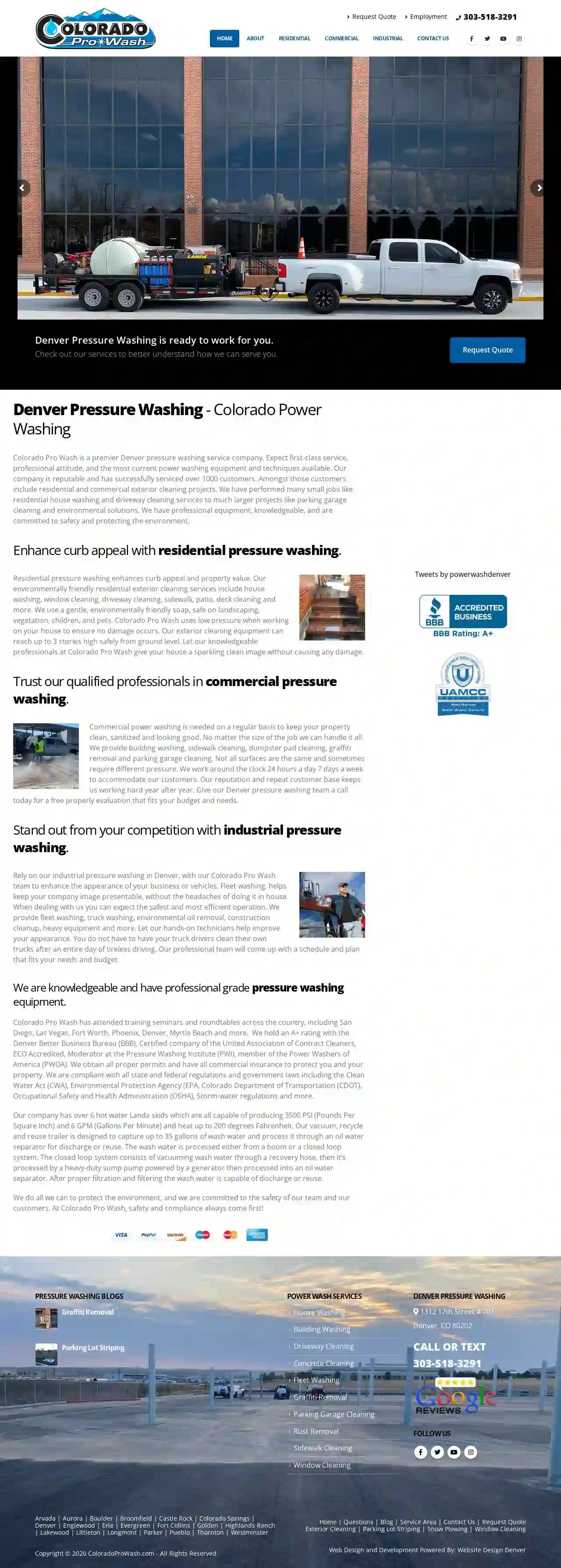
Colorado Pro Wash
Denver, USColorado Pro Wash is a professional pressure washing company serving the Denver area and Southern Colorado. We offer a wide range of services including residential and commercial pressure washing, concrete cleaning, driveway cleaning, rust removal, and more. Our team is dedicated to providing exceptional service and ensuring customer satisfaction. With years of experience and a commitment to quality, we are the go-to choice for pressure washing in the Denver area.
- Services
- Why Us?
- Accreditations
- Our Team
- Testimonials
- Gallery
Get Quote
Bayou Boys Soft Washing LLC
51 reviewsLafayette, LA, PO Box 51752, 70505, USBayou Boys Soft Washing is a local business offering professional soft washing services in the Acadiana area. They provide a variety of services including pressure washing, soft washing, gutter maintenance, sidewalk maintenance cleaning, and more. Their team is experienced, insured, and reliable, and they offer contracts for their services. They cater to both residential and commercial properties and are ready to tackle any cleaning job.
- Services
- Why Us?
- Our Team
- Testimonials
- Gallery
Get Quote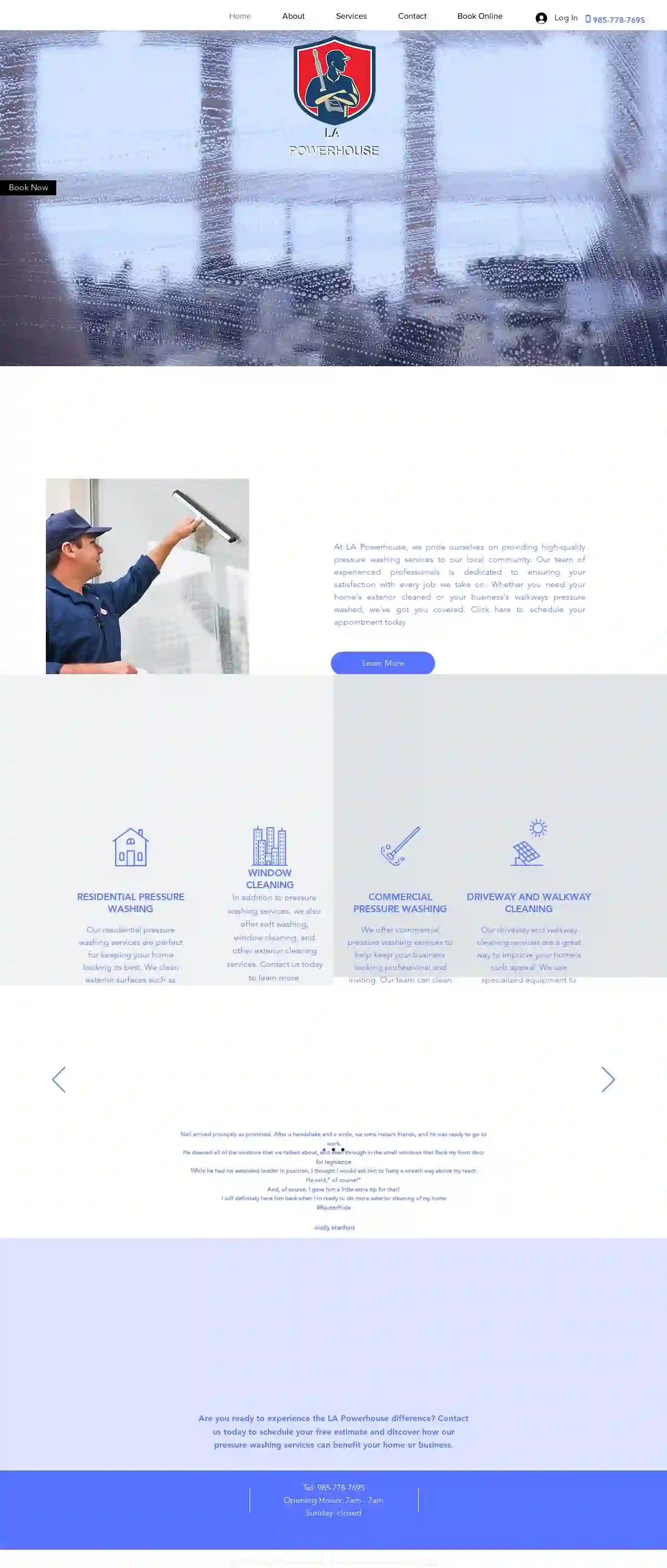
LA Powerhouse Pressure Washing LLC
516 reviewsLafayette, USAt LA Powerhouse, we pride ourselves on providing high-quality pressure washing services to our local community. Our team of experienced professionals is dedicated to ensuring your satisfaction with every job we take on. Whether you need your home's exterior cleaned or your business's walkways pressure washed, we've got you covered. Our residential pressure washing services are perfect for keeping your home looking its best. We clean exterior surfaces such as siding, decks, and patios to remove dirt, grime, and other buildup that can cause damage over time. We offer commercial pressure washing services to help keep your business looking professional and inviting. Our team can clean exterior surfaces such as sidewalks, entryways, and parking lots to remove dirt, gum, and other unsightly buildup. Our driveway and walkway cleaning services are a great way to improve your home's curb appeal. We use specialized equipment to remove dirt, oil, and other stains from your concrete and paver surfaces. In addition to pressure washing services, we also offer soft washing, window cleaning, and other exterior cleaning services.
- Services
- Why Us?
- Testimonials
- Gallery
Get Quote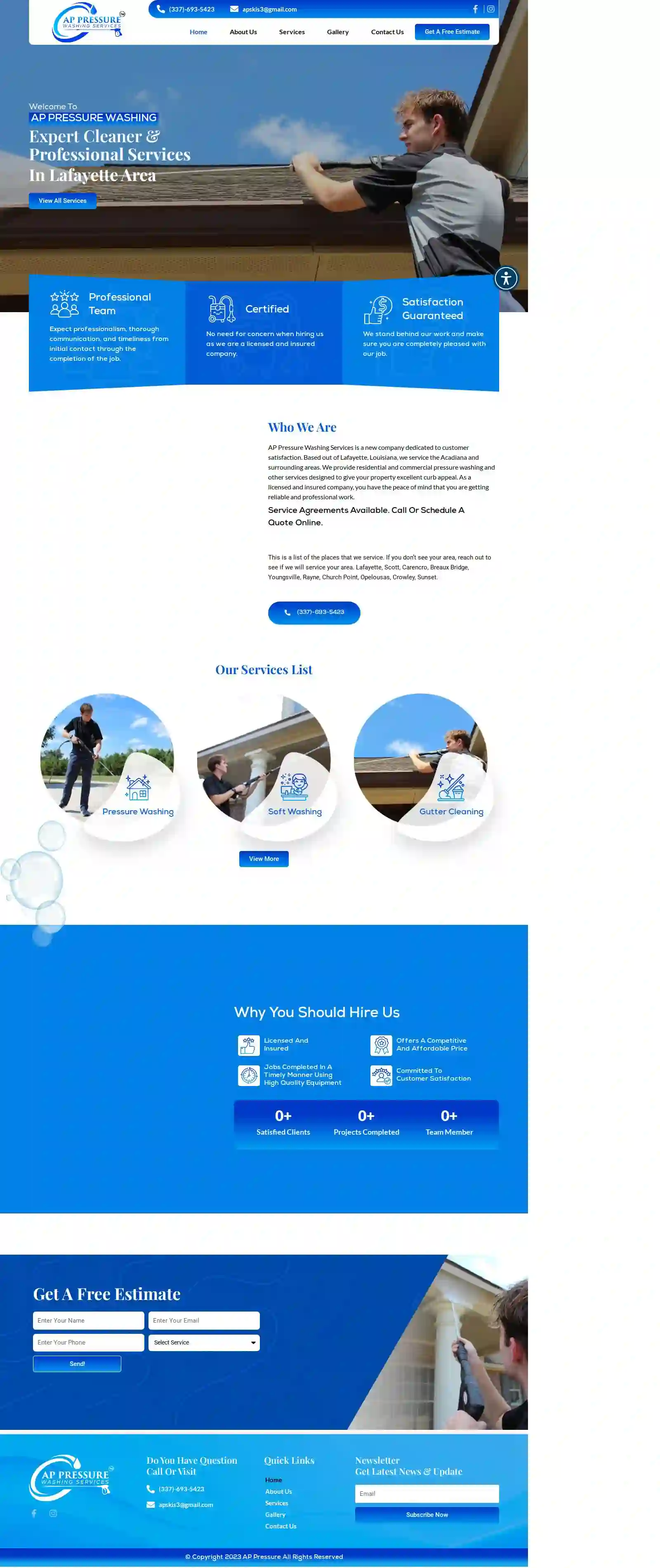
AP Pressure Washing Services
510 reviewsLafayette, USAP Pressure Washing Services is a new company dedicated to customer satisfaction. Based out of Lafayette, Louisiana, we service the Acadiana and surrounding areas. We provide residential and commercial pressure washing and other services designed to give your property excellent curb appeal. As a licensed and insured company, you have the peace of mind that you are getting reliable and professional work. Service Agreements are available. Call or schedule a quote online. This is a list of the places that we service. If you don’t see your area, reach out to see if we will service your area. Lafayette, Scott, Carencro, Breaux Bridge, Youngsville, Rayne, Church Point, Opelousas, Crowley, Sunset.
- Services
- Why Us?
- Gallery
Get Quote
Pali Pressure Pros
520 reviewsLafayette, USThe Best Pressure Washing Service In New Orleans, Metairie, Kenner, Gretna, Harvey, Timberlane, Terrytown, Belle Chasse, Marrero, and Westwego. We here at Pali Pressure Pros offer efficient, reliable pressure washing services to help keep your home or business looking great! We always love to serve our community here in Louisiana all the way from Kenner to Belle Chasse and everywhere in between. We understand that there are a lot of options out there and it can be overwhelming. How could it not be? This is your home, a sacred vessel that you love. We understand this immensely, and that's why our team makes sure to take very special care of every home that we visit. Whether we are cleaning your house's siding, roof, driveway, or just a fence we take the utmost care and use only the best and safest cleaning techniques. We offer residential and commercial pressure washing services to clean your homes, driveways, sidewalks, decks, patios, and more. With a combination of our pressure washing equipment and eco-friendly cleaning solutions we clean, restore, and protect all the surfaces of your home or business. Let us take care of your pressure washing needs and let your property shine!
- Services
- Why Us?
- Gallery
Get Quote
Venturini's Pressure Washing & Surface Cleaning
544 reviewsLafayette, USLocal. Family Owned. Trusted. Professional exterior cleaning services Elevate your property's allure with our unmatched exterior cleaning and restoration solutions, ensuring pristine surfaces and lasting brilliance. Get a quote Give us a call Our Services How Can We Help You? Venturini's Pressure Washing & Surface Cleaning offers a comprehensive range of expert exterior cleaning and restoration services. From powerful pressure washing to delicate house and roof washing, as well as specialized services like paver sealing and wood restoration, we ensure exceptional results for both residential and commercial properties.
- Services
- Why Us?
- Gallery
Get Quote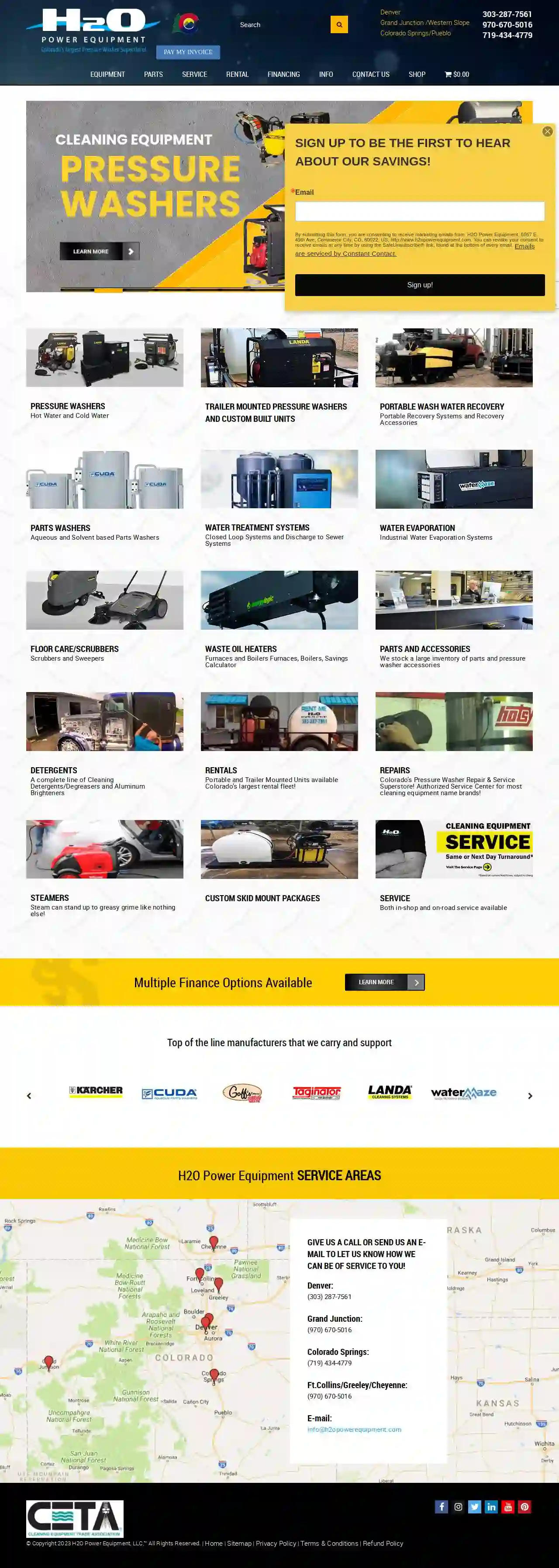
H2O Power Equipment
4.7201 reviewsDenver, 14011, USH2O Power Equipment is your one-stop shop for all your pressure washing needs. We offer a wide variety of hot water and cold water pressure washers, as well as trailers and custom installs. We also carry a full line of parts and accessories, including detergents, burners, coils, couplers, fittings, filters, electrical components, engines, motors, pulleys, guns, wands, lances, hoses, reels, nozzles, pumps, pump kits, unloaders, injectors, valves, and gauges. We offer both in-shop and on-road service, and we are an authorized service center for most cleaning equipment name brands. We also offer rentals, financing, and combatting invasive species solutions.
- Services
- Why Us?
- Gallery
Get Quote
Power Washing Pros
517 reviewsThibodaux, LA, 2572 Talbot Ave, 70301, USPower Washing Pros LLC is a trusted name in pressure washing services in Thibodaux, providing high-quality and affordable services to residential and commercial properties. With 10 years of experience and OSHA 50 certification, they offer a wide variety of services including building washing, commercial pressure washing, deck & fence cleaning, and more. Their commitment to customer satisfaction and dedication to improving the aesthetics and durability of homes and businesses in Southern Louisiana sets them apart.
- Services
- Why Us?
- Accreditations
- Our Team
- Testimonials
- Gallery
Get Quote
Premier Pressure Wash
53 reviews985-722-8355, New Orleans, 70123, USPremier Pressure Wash, LLC is your trusted partner for all your pressure washing and soft washing needs throughout the NOLA Metro and surrounding areas. We pride ourselves on our experienced and reliable team, who pay meticulous attention to detail, ensuring exceptional results for every project. Our commitment to customer satisfaction is unwavering, and we strive to exceed your expectations with our best-in-class professional technicians. Whether you need a thorough cleaning for your home, commercial building, or any other surface, Premier Pressure Wash, LLC is here to make your property shine. We offer a comprehensive range of services, including soft wash, gutter cleaning, roof wash, fence cleaning, and more. Our team utilizes the latest equipment and techniques to deliver safe and effective cleaning solutions that protect your investment and enhance your property's curb appeal. At Premier Pressure Wash, LLC, we understand the importance of clear communication and strive to be in constant contact with our customers throughout the entire process. We're dedicated to providing a seamless and stress-free experience from start to finish. Contact us today to schedule your pressure washing service and let us transform your property!
- Services
- Why Us?
- Gallery
Get Quote
Over 60,241+ Cleaning Contractors onboarded
Our janitorial companies operate in Gypsum & beyond!
CleaningMatch has curated and vetted Top Janitorial Services near Gypsum. Find a top & trustworthy business today.
Frequently Asked Questions About Pressure Washing
- Annually: Pressure washing your house at least once a year helps remove accumulated dirt, grime, and other contaminants, keeping it looking its best.
- Every 2-3 Years: If you live in an area with high humidity, heavy tree cover, or frequent exposure to pollutants, more frequent pressure washing may be necessary.
- When Visible Dirt and Grime Appear: Address visible dirt, stains, or mold growth promptly to prevent them from becoming more challenging to remove.
- Enhanced Curb Appeal: Pressure washing removes dirt, grime, and stains, instantly revitalizing the appearance of your property and boosting curb appeal.
- Improved Health and Safety: Pressure washing removes mold, mildew, algae, and other contaminants that can pose health risks and create slippery surfaces.
- Increased Property Value: A well-maintained exterior, achieved through regular pressure washing, can increase the value of your property.
- Preventative Maintenance: Pressure washing removes dirt and grime that can deteriorate surfaces over time, extending the lifespan of your driveway, deck, fence, and other exterior features.
- Preparation for Painting or Staining: Pressure washing is an essential step before painting or staining, as it provides a clean and receptive surface for the new coating to adhere to.
- Reputation and Reviews: Check online reviews and ask for referrals to gauge the company's reputation and customer satisfaction.
- Experience and Expertise: Look for a company with a proven track record and experience in pressure washing various surfaces.
- Licensing and Insurance: Ensure the company is licensed and insured to protect you from liability.
- Equipment and Techniques: Inquire about the company's equipment and techniques to ensure they use appropriate pressure levels and cleaning solutions.
- Quotes and Pricing: Obtain detailed quotes that outline all services and costs.
- Professionalism and Communication: Choose a company that is responsive, communicative, and professional.
- Experience and Expertise: Professionals have the knowledge and skills to choose the right pressure levels and cleaning solutions for different surfaces, minimizing the risk of damage.
- Professional Equipment: Pressure washing companies use commercial-grade equipment that is more powerful and efficient than consumer-grade pressure washers.
- Safety: Pressure washing can be hazardous, especially when working on ladders or with high-pressure water. Professionals are trained in safety procedures and have the necessary equipment to work safely.
- Time-Saving: Pressure washing can be time-consuming, especially for larger projects. Hiring professionals frees up your time for other tasks.
How often should I pressure wash my house?
Regular pressure washing can maintain your home's exterior, extend the lifespan of your siding, and enhance its curb appeal.
What are the benefits of pressure washing?
Whether you're looking to improve your property's appearance, protect its value, or enhance health and safety, pressure washing is a valuable investment.
What should I look for in a pressure washing company?
A reputable pressure washing company will prioritize safety, use appropriate cleaning methods, and provide excellent customer service.
Can I pressure wash my own house?
If you're considering DIY pressure washing, assess the complexity of the project, your experience, and the risks involved. For larger or more challenging projects, hiring professionals is often a wiser and safer choice.
How often should I pressure wash my house?
- Annually: Pressure washing your house at least once a year helps remove accumulated dirt, grime, and other contaminants, keeping it looking its best.
- Every 2-3 Years: If you live in an area with high humidity, heavy tree cover, or frequent exposure to pollutants, more frequent pressure washing may be necessary.
- When Visible Dirt and Grime Appear: Address visible dirt, stains, or mold growth promptly to prevent them from becoming more challenging to remove.
Regular pressure washing can maintain your home's exterior, extend the lifespan of your siding, and enhance its curb appeal.
What are the benefits of pressure washing?
- Enhanced Curb Appeal: Pressure washing removes dirt, grime, and stains, instantly revitalizing the appearance of your property and boosting curb appeal.
- Improved Health and Safety: Pressure washing removes mold, mildew, algae, and other contaminants that can pose health risks and create slippery surfaces.
- Increased Property Value: A well-maintained exterior, achieved through regular pressure washing, can increase the value of your property.
- Preventative Maintenance: Pressure washing removes dirt and grime that can deteriorate surfaces over time, extending the lifespan of your driveway, deck, fence, and other exterior features.
- Preparation for Painting or Staining: Pressure washing is an essential step before painting or staining, as it provides a clean and receptive surface for the new coating to adhere to.
Whether you're looking to improve your property's appearance, protect its value, or enhance health and safety, pressure washing is a valuable investment.
What should I look for in a pressure washing company?
- Reputation and Reviews: Check online reviews and ask for referrals to gauge the company's reputation and customer satisfaction.
- Experience and Expertise: Look for a company with a proven track record and experience in pressure washing various surfaces.
- Licensing and Insurance: Ensure the company is licensed and insured to protect you from liability.
- Equipment and Techniques: Inquire about the company's equipment and techniques to ensure they use appropriate pressure levels and cleaning solutions.
- Quotes and Pricing: Obtain detailed quotes that outline all services and costs.
- Professionalism and Communication: Choose a company that is responsive, communicative, and professional.
A reputable pressure washing company will prioritize safety, use appropriate cleaning methods, and provide excellent customer service.
Can I pressure wash my own house?
- Experience and Expertise: Professionals have the knowledge and skills to choose the right pressure levels and cleaning solutions for different surfaces, minimizing the risk of damage.
- Professional Equipment: Pressure washing companies use commercial-grade equipment that is more powerful and efficient than consumer-grade pressure washers.
- Safety: Pressure washing can be hazardous, especially when working on ladders or with high-pressure water. Professionals are trained in safety procedures and have the necessary equipment to work safely.
- Time-Saving: Pressure washing can be time-consuming, especially for larger projects. Hiring professionals frees up your time for other tasks.
If you're considering DIY pressure washing, assess the complexity of the project, your experience, and the risks involved. For larger or more challenging projects, hiring professionals is often a wiser and safer choice.